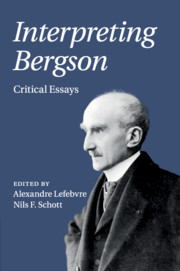Book contents
- Interpreting Bergson
- Interpreting Bergson
- Copyright page
- Contents
- Figures
- Contributors
- Abbreviations
- Introduction
- Chapter 1 Bergson’s Theory of Truth
- Chapter 2 What Was “Serious Philosophy” for the Young Bergson?
- Chapter 3 Bergson and Naturalism
- Chapter 4 Bergson on the True Intellect
- Chapter 5 Bergson’s Philosophy of Art
- Chapter 6 Bergson, the Time of Life, and the Memory of the Universe
- Chapter 7 Bergson and Philosophy as a Way of Life
- Chapter 8 Bergson and Social Theory
- Chapter 9 Bergson and Political Theory
- Chapter 10 Bergson, Colonialism, and Race
- Chapter 11 Bergson’s Philosophy of Religion
- Bibliography
- Index
Introduction
Published online by Cambridge University Press: 22 November 2019
- Interpreting Bergson
- Interpreting Bergson
- Copyright page
- Contents
- Figures
- Contributors
- Abbreviations
- Introduction
- Chapter 1 Bergson’s Theory of Truth
- Chapter 2 What Was “Serious Philosophy” for the Young Bergson?
- Chapter 3 Bergson and Naturalism
- Chapter 4 Bergson on the True Intellect
- Chapter 5 Bergson’s Philosophy of Art
- Chapter 6 Bergson, the Time of Life, and the Memory of the Universe
- Chapter 7 Bergson and Philosophy as a Way of Life
- Chapter 8 Bergson and Social Theory
- Chapter 9 Bergson and Political Theory
- Chapter 10 Bergson, Colonialism, and Race
- Chapter 11 Bergson’s Philosophy of Religion
- Bibliography
- Index
Summary
In the years just before the First World War, Henri Bergson (1859–1941) was at the height of his fame. His first two books, Time and Free Will (1889) and Matter and Memory (1896), had established him as the preeminent philosopher of France. But it was the publication of Creative Evolution in 1907 that made him a genuine cultural sensation. Avant-garde artists and writers flocked to his lectures at the Collège de France. As did “high society”: so much so that students, tired of losing their seats to those able to send valets hours in advance to reserve seats, circulated an (ultimately unsuccessful) petition to ban the general public. And on the day Bergson was elected to the French Academy, he found his lectern showered with flower petals, leading him to protest, “but … I am not a dancer!”
- Type
- Chapter
- Information
- Interpreting BergsonCritical Essays, pp. 1 - 12Publisher: Cambridge University PressPrint publication year: 2019

